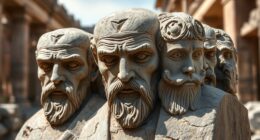Socrates' timeless wisdom challenges you to rethink your life through profound reflections. He believed that "the unexamined life isn't worth living," urging you to practice self-reflection for personal growth. He emphasized that true happiness comes from appreciating what you already have, rather than chasing material wealth. Curiosity fuels your pursuit of knowledge, transforming your beliefs. Embrace change and see each setback as a stepping stone toward resilience. By nurturing genuine friendships rooted in respect, you'll enrich your life. These ideas not only inspire you to reflect but also open up a path to deeper insights and understanding.
Key Takeaways
- Socrates emphasized the importance of self-reflection, urging individuals to examine their lives for deeper understanding and personal growth.
- He highlighted that true wisdom lies in recognizing one's limitations and applying knowledge in meaningful ways.
- Socratic inquiry encourages questioning assumptions, fostering curiosity and a lifelong commitment to learning and personal development.
- Socrates taught that happiness comes from appreciating what one has, rather than pursuing material wealth for fulfillment.
- He believed that genuine friendships and relationships are essential for emotional intimacy, mutual respect, and personal growth.
The Unexamined Life

Socrates' assertion that "the unexamined life isn't worth living" serves as a powerful reminder of the necessity for self-reflection. When you pause to examine your thoughts and actions, you open the door to greater self-awareness and wisdom. Engaging in self-reflection can enhance your problem-solving abilities and promote continuous learning, ultimately leading to a more fulfilling life curiosity and happiness.
Without self-reflection, you risk living an unexamined life, where decisions are made without consideration of your core values and beliefs. By questioning your own assumptions, you can align your actions with what truly matters to you. This practice not only fosters personal growth but also cultivates a deeper understanding of yourself and the world around you.
Socratic philosophy emphasizes that life isn't just about existing; it's about examining the choices you make and the reasons behind them. In today's fast-paced society, the relevance of self-reflection remains undeniable. It serves as a foundation for ethical living and personal development.
True Wisdom and Knowledge

To truly grasp wisdom, you need to embrace the pursuit of knowledge and recognize your own limitations.
Socrates taught that self-reflection is essential for personal growth, urging you to question your beliefs and experiences.
Pursuit of Knowledge
In the pursuit of knowledge, you'll find that true wisdom lies not in what you know, but in recognizing what you don't. Socrates emphasized that the journey of learning is endless, encouraging you to embrace intellectual humility. He believed that knowledge is the only true good, urging you to seek understanding rather than settle for ignorance.
Through dialogue and questioning, you can foster a culture of critical thinking, moving beyond rote memorization. Remember, the pursuit of knowledge requires continuous self-examination and reflection on your beliefs and values. True wisdom isn't merely about accumulating facts; it's about applying that knowledge thoughtfully and ethically in your life.
| Aspect | Knowledge | Wisdom |
|---|---|---|
| Definition | Information gained | Ability to apply knowledge |
| Nature | Static | Dynamic |
| Focus | Accumulation | Application in real life |
As you engage in this lifelong pursuit, recognize the importance of both knowledge and wisdom. Let Socrates' teachings inspire you to question, learn, and grow on your journey.
Importance of Self-Reflection
Self-reflection acts as a mirror, revealing the depths of your thoughts and beliefs. When you take the time to engage in self-reflection, you align your actions with your values, leading to a more intentional life.
Socrates famously said, "The unexamined life isn't worth living," reminding you that understanding yourself is essential for personal growth.
By acknowledging that "the only true wisdom is in knowing you know nothing," you embrace intellectual humility and open yourself to the continuous pursuit of knowledge. This mindset encourages you to question your beliefs and engage in dialogue, facilitating deeper insights into your character and motivations.
Socratic philosophy emphasizes the distinction between knowledge and ignorance, urging you to seek truth for moral and ethical living. Self-reflection fosters this pursuit, enabling you to confront your assumptions and biases.
As you practice self-reflection, you not only gain wisdom but also cultivate a life that resonates with your core principles. Ultimately, embracing self-reflection empowers you to navigate life's complexities with clarity, ensuring your choices reflect your true self.
Happiness and Contentment

When you think about happiness, consider that true wealth lies within, not in external possessions.
Embracing simple pleasures can lead to genuine contentment, allowing you to appreciate what you already have.
Socrates teaches us that happiness stems from a mindset of gratitude and self-reflection, rather than from chasing after more.
True Wealth Within
True wealth lies within you, shaped by your perspective on life and what truly brings happiness. Socrates believed that appreciating what you already have leads to genuine contentment. He stated, "He who is not contented with what he has, would not be contented with what he would like to have." This emphasizes the importance of gratitude in nurturing inner peace.
Instead of chasing material wealth, Socrates encouraged you to find joy in simplicity. He warned that luxury can lead to artificial poverty, detracting from true fulfillment. By focusing on personal growth and self-improvement, you cultivate true wisdom.
Here's a quick comparison to reflect on:
| Focus Area | Outcome |
|---|---|
| Pursuit of Material Wealth | Artificial Poverty |
| Embracing Simplicity | Inner Peace |
| Cultivating Gratitude | True Happiness |
Socrates' philosophy invites you to reflect on your values. By prioritizing character and virtue over possessions, you reveal the true wealth within yourself. This mindset not only fosters happiness but also enriches your overall life experience.
Embracing Simple Pleasures
This insight encourages you to cultivate gratitude for your current circumstances instead of yearning for material possessions.
By adopting a minimalist approach, you can avoid the artificial poverty that often accompanies luxury. Instead of seeking wealth and status, find joy in everyday experiences—a warm cup of coffee, a walk in nature, or a heartfelt conversation with a friend.
Simplicity fosters genuine fulfillment, allowing you to recognize that happiness arises from valuing these small moments.
The Nature of Friendship

Friendship plays an essential role in our lives, shaping who we are and how we grow. Socrates emphasized that genuine friendship requires commitment and effort. He urged you to be cautious about whom you let into your life, but once you form a bond, nurture it with kindness and empathy.
| Aspect | Description | Impact on Life |
|---|---|---|
| Commitment | Be slow to fall into friendship | Strengthens relationships |
| Shared Values | Build connections on common beliefs | Encourages personal growth |
| Mutual Respect | Treat others with kindness | Fosters lasting friendships |
| Reflection | Use friendships for self-improvement | Enhances personal insight |
Understanding the nature of friendship through a Socratic lens reveals its complexities. Whether in platonic or marital relationships, companionship plays a significant role in our experience. Socrates believed that true friends uplift one another, paving the way for personal growth. Embrace the opportunities for reflection and learning that friendships provide, and you'll find that they are essential for your development. By committing to deep, meaningful connections, you cultivate a richer, more fulfilling life.
Education as a Journey

Education isn't just a phase; it's a lifelong journey where you continuously seek knowledge and self-awareness.
By embracing curiosity and engaging in self-reflection, you cultivate a mindset that challenges assumptions and fosters growth.
As Socrates showed us, the questions you ask can ignite your path to deeper understanding and wisdom.
Lifelong Learning Philosophy
Learning isn't just a phase; it's a lifelong journey that transforms how you see the world. Socrates believed education should ignite curiosity, describing it as "the kindling of a flame, not the filling of a vessel." This perspective encourages you to embrace continuous self-improvement and exploration.
By prioritizing critical thinking and independent thought, you can navigate real-world challenges more effectively. Socratic philosophy emphasizes the importance of questioning your own beliefs. Engaging in self-examination and dialogue with others reveals that true knowledge isn't static; it's dynamic and requires ongoing exploration.
As you journey through life, consider every experience an opportunity for growth. Education extends beyond classrooms; it encompasses all aspects of life and personal development.
Incorporating Socratic principles into your daily routine fosters a mindset that values learning at every turn. Whether through reading, conversations, or reflecting on experiences, you can cultivate deeper knowledge and understanding.
Importance of Self-Reflection
Amid the hustle and bustle of daily life, taking a moment for self-reflection is crucial for genuine personal growth. Socrates famously said, "The unexamined life isn't worth living," highlighting the necessity of looking inward to truly understand yourself. By engaging in self-reflection, you align your actions with your personal values, fostering conscious decision-making.
Socrates viewed education as a lifelong journey, emphasizing continuous learning over mere accumulation of knowledge. This perspective encourages you to see self-reflection as a critical part of your educational process, helping to kindle the flame of curiosity and insight within you.
Through introspection, you can examine your beliefs and thoughts, allowing you to adapt to life's changes more effectively. The practice of self-examination not only aids in your personal development but also enhances your capacity to thrive in a rapidly changing world.
Embracing Curiosity and Inquiry
At the heart of personal growth lies the pursuit of curiosity and inquiry, elements that Socrates championed throughout his teachings. He believed education isn't just about filling your mind with facts; it's about sparking a flame of curiosity that drives you to engage actively in learning.
By embracing inquiry, you challenge your own beliefs and open yourself to new perspectives, which ultimately leads to greater wisdom. Socrates emphasized that the journey of education is lifelong. This means you should continually seek knowledge, asking questions that push the boundaries of your understanding.
His famous assertion, "Wonder is the beginning of wisdom," highlights how curiosity acts as a catalyst for exploration. When you wonder about the world, you initiate a quest that deepens your self-awareness.
Through dialogue and self-reflection, you reveal new insights about yourself and your choices. This process of questioning isn't just academic; it's essential for personal development. By embracing Socratic principles, you foster an environment where learning thrives, leading you to a richer, more meaningful life.
Personal Growth and Resilience

While aiming for personal growth, you'll find that resilience plays an essential role in your journey. Socrates teaches that self-improvement is a continuous pursuit, reminding you that "We cannot live better than in seeking to become better." When setbacks occur, remember his wisdom: "Falling down is not a failure; staying down is." This perspective encourages you to learn from your experiences and grow stronger.
To foster resilience, consider these key concepts:
| Concept | Importance | Socratic Quote |
|---|---|---|
| Self-Reflection | Promotes deeper understanding of yourself | "The unexamined life is not worth living." |
| Adaptability | Allows for personal growth through change | "It is better to change an opinion than to persist in a wrong one." |
| Curiosity | Fuels the desire for knowledge and wisdom | "Wisdom begins with wonder." |
Embracing Change

Change is a constant in life, and embracing it can lead to profound personal growth. Socrates understood that resisting change only brings suffering. He emphasized that "Change is law and no amount of pretending will alter that reality," urging you to accept and adapt to life's transformations.
By embracing change, you open yourself to new ideas and perspectives, which is essential for personal growth. When you cultivate a growth mindset, you're willing to adjust your opinions based on new information. This adaptability not only enhances your learning but also fosters true wisdom.
Socrates believed that acknowledging the transient nature of existence allows you to respond positively to life's challenges, making you more resilient. As you navigate through life's inevitable changes, remember that embracing change can transform your experiences.
Instead of clinging to outdated beliefs, let go and welcome the unknown. Each change you encounter is an opportunity for growth and self-improvement. By following Socrates' philosophy, you'll discover that embracing change can lead to a richer, more fulfilling life, filled with wisdom and resilience.
The Value of Relationships

Understanding the value of relationships is essential for personal growth and fulfillment. Socrates believed that true friendship requires effort and commitment. He advised being slow to enter friendships but steadfast once they're formed. This means taking the time to build genuine connections, which ultimately enrich your life.
In relationships, especially after challenges, fostering emotional intimacy is essential; without it, disconnection can occur, leading to potential issues. The importance of trust can't be overstated, as it forms the foundation of any meaningful connection.
Empathy plays a critical role in nurturing these relationships. Socrates famously stated, "Be kind, for everyone you meet is fighting a hard battle." This highlights the importance of understanding the struggles others face, fostering a deeper sense of connection and compassion in your friendships.
Moreover, Socratic philosophy emphasizes prioritizing relationships that promote mutual respect and personal growth. Meaningful connections can greatly enhance your overall quality of life.
Socrates also acknowledged the complexities of marital relationships, suggesting that both marriage and celibacy can lead to regret. This illustrates the necessity of companionship and the importance of learning from your experiences with others.
Perspectives on Failure

Failure is often seen as an intimidating obstacle, but Socrates offers a revitalizing perspective on it. He believed that "Falling down isn't a failure; staying down is." This view encourages you to recognize that resilience is vital for personal growth.
When you encounter setbacks, it's essential to rise again and learn from the experience. Socrates emphasized that each failure holds valuable lessons that contribute to your character and wisdom.
Instead of shying away from mistakes, he urged you to embrace them as integral parts of the human experience. True failure, according to Socrates, occurs not when you make mistakes but when you fail to act or reflect on your experiences.
This philosophy promotes perseverance, reminding you that the journey to improvement is often fraught with obstacles.
Understanding the Human Condition

In grappling with life's complexities, it's crucial to recognize our shared struggles as part of the human experience. Socrates reminds you that everyone is fighting their own battles, urging you to cultivate empathy.
By incorporating practices that enhance mental clarity, such as clearing brain fog, you can better navigate your own challenges and support others in their journeys. When you embrace this understanding, you foster deeper connections with those around you.
- Acknowledge change: Accept that life is transient. Socrates teaches that resisting change only leads to frustration.
- Practice self-reflection: Embrace the idea that "The unexamined life isn't worth living." Reflecting on your choices can lead to greater self-awareness.
- Find happiness within: True happiness doesn't come from seeking more but from appreciating the simple pleasures in life.
Frequently Asked Questions
What Is the Most Famous Socrates Quote?
One of Socrates' most famous quotes is, "The unexamined life is not worth living." This statement urges you to reflect on your existence, encouraging personal growth and the pursuit of deeper understanding in your life.
What Are the Three Golden Words of Socrates?
Socrates' three golden words are "Know Thyself." They remind you to reflect on your beliefs and motivations. Embracing self-awareness helps you understand your strengths and weaknesses, fostering personal growth and authentic living.
What Did Socrates Say About Self?
Socrates believed self-examination's essential. He urged you to recognize your ignorance and think independently. By working towards personal growth and contentment, you can truly discover yourself and lead a more fulfilling life.
What Is an Examined Life According to Socrates?
Imagine sailing through uncharted waters; an examined life, according to Socrates, means charting your beliefs and actions. You reflect, question, and learn, steering towards a meaningful existence crafted by your own insights and truths.
Conclusion
As you reflect on Socrates' timeless insights, remember that life's journey isn't just about reaching the destination—it's about the lessons learned along the way. Embrace the gentle nudges of wisdom that guide you through the uncertainties and the quiet moments of joy. By examining your life and nurturing your relationships, you'll find that even the smallest steps can lead to profound transformations. So, let curiosity light your path, and cherish the beauty of becoming.









